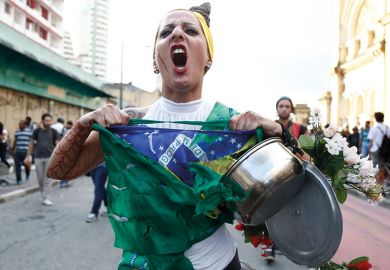Brazilian universities are hoping that a major shift in focus in how the country funds internationalisation will change its past tendency to be a “passive” participant in higher education’s globalisation.
The Capes-PrInt programme, which has an annual budget of around 300 million real (£60 million), was launched last year with the aim of funding up to 40 universities and their internationalisation projects.
Run by Brazil’s public higher education agency, Capes, the scheme differs hugely from the country’s previous major internationalisation effort, Science Without Borders, which had a much larger budget and concentrated on funding scholarships for Brazilian students to study abroad.
Capes-PrInt instead asked universities to submit their own proposals for improving global links and has looked to fund projects that encompass all aspects of internationalisation, including increasing the number of staff and students visiting Brazil from other countries.
At a British Council event on Brazil-UK university cooperation, which took place in London earlier this month, representatives from a number of Brazilian universities explained how they had high hopes for the initiative, which has announced backing for projects at 36 institutions.
Heloísa Orsi Koch Delgado, dean of international relations at the Pontifical Catholic University of Rio Grande do Sul, told the event that in the past there had been a “strong tendency for ‘passive’ internationalisation in Brazil. We go abroad more often than [people come] into the country and this is something that needs to be changed.”
Marcio de Castro Silva Filho, deputy provost of graduate studies at the University of São Paulo, said that his institution was now offering more than 250 courses in English and has stepped up hiring of academics from overseas. “We really want to create an international environment at USP,” he said.
However, the academics were also asked about whether the programme – brought in under the current Brazilian administration and due to run until 2022 – would survive any changes instigated by the controversial new president Jair Bolsonaro when he assumes power next month.
Professor Silva Filho, who was also representing Capes at the event, said: “Hopefully this programme will not be linked to a government but it will become a national programme. That is our expectation.”
Roberto Arruda, director of international student academic success at the University of Colorado Boulder and an expert on Brazil’s internationalisation programmes, told Times Higher Education separately that, although the future of PrInt was as uncertain as any government scheme following Mr Bolsonaro’s election, the programme was already well under way.
And generally, he said that Capes-PrInt had “significant advantages” over SWB given that it had “great potential” to help Brazil with “long-lasting structures to support international research, internationalisation of curricula, exposing faculty and students to a global knowledge community, and internationalisation at home”.
But Mr Arruda added that one concern was that it may only fund institutions that are already strong at internationalisation.
“The Brazilian government is giving a substantial amount of money for [higher education institutions] to internationalise; however, only institutions that already have some expertise are able to take advantage of it. It would be beneficial for the institutions that have had no experience with it to receive support as well,” he said.
Professor Silva Filho told THE that it was expected that those that won funding “will give support to other universities within the same region in terms of access to actions such as visiting lecturers, international classes etc” while the money would also help train internationalisation experts who could then benefit the whole academic community.
Capes was also due to launch a separate scheme for improving postgraduate programmes more generally in Brazil that had among its aims the strengthening of international ties, he said.
POSTSCRIPT:
Print headline: Brazil plans to step up its activity as a global player
Register to continue
Why register?
- Registration is free and only takes a moment
- Once registered, you can read 3 articles a month
- Sign up for our newsletter
Subscribe
Or subscribe for unlimited access to:
- Unlimited access to news, views, insights & reviews
- Digital editions
- Digital access to THE’s university and college rankings analysis
Already registered or a current subscriber?








